Topic #1: How can policy-makers make the case that they will combat corruption and fight the influence of special interests and lobbyists?
In April, the Navigator showed Americans believe corruption is endemic in Washington. This concern continues, unabated, and so many are looking for leaders who put the people ahead of corporate donors and personal perks as they work to make government more accountable.
Topic #2: Where do Americans stand on health care a year after the failure of Republicans’ Obamacare replacement push?
In July, Navigator found health care costs imposing the biggest strain on Americans’ wallets. Two months later, health care costs remain a top concern, and the gap in perceptions of the two parties continues to grow.
Topic #3: What do Americans think of Supreme Court nominee Brett Kavanaugh and how his confirmation process has been handled?
Americans remain negative towards Kavanaugh personally and divided on his confirmation. Many believe Kavanaugh was picked to protect Donald Trump from the Special Counsel investigation, and there is support for delaying confirmation until he promises to recuse himself – or until the many unreleased documents from his time in Washington are made public.
1 | The Anti-Corruption Case Americans Want to Hear
Both parties have work to do on the corruption issue, but Democrats are gaining ground while Republicans have fallen behind.
Democrats have made significant progress in recent months on being favored to reduce corruption. Over the past several months, there has been a marked shift in public opinion among voters who did prefer a party on “reducing government corruption.” In June, the public gave a five point edge to Republicans in Congress on which party is more trusted to reduce corruption in government, but Democrats have now opened up an 11-point lead. Democrats also lead by nine points when it comes to putting Americans ahead of big campaign donors and by 21 points when it comes to standing up to the influence of big corporations and lobbyists.
That said, asked which party they trust more to cut down on corruption, 37% refuse to pick either party, including 67% of independents – that’s more than refuse to pick a party on any of 14 other issues tested, and a sign that the “plague on both their houses” sentiment is especially strong when it comes to cleaning up Washington.
Democrats in Congress have opened up a real lead on who is better to reduce government corruption.
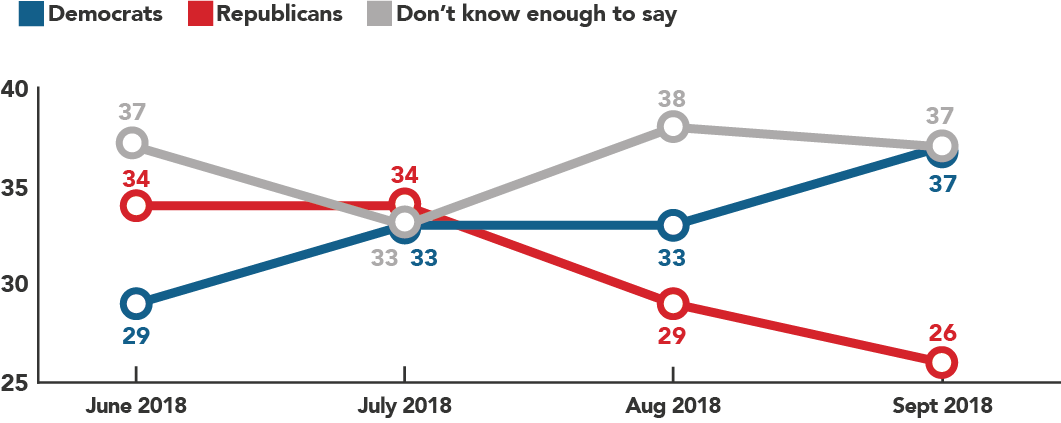
Those most likely to say they “don’t know” which party is best on reducing corruption are independents, younger Americans, and whites with a four-year college degree.
The high level of “don’t know” responses presents an opportunity for leaders from both parties to further define their position with these movable constituencies.
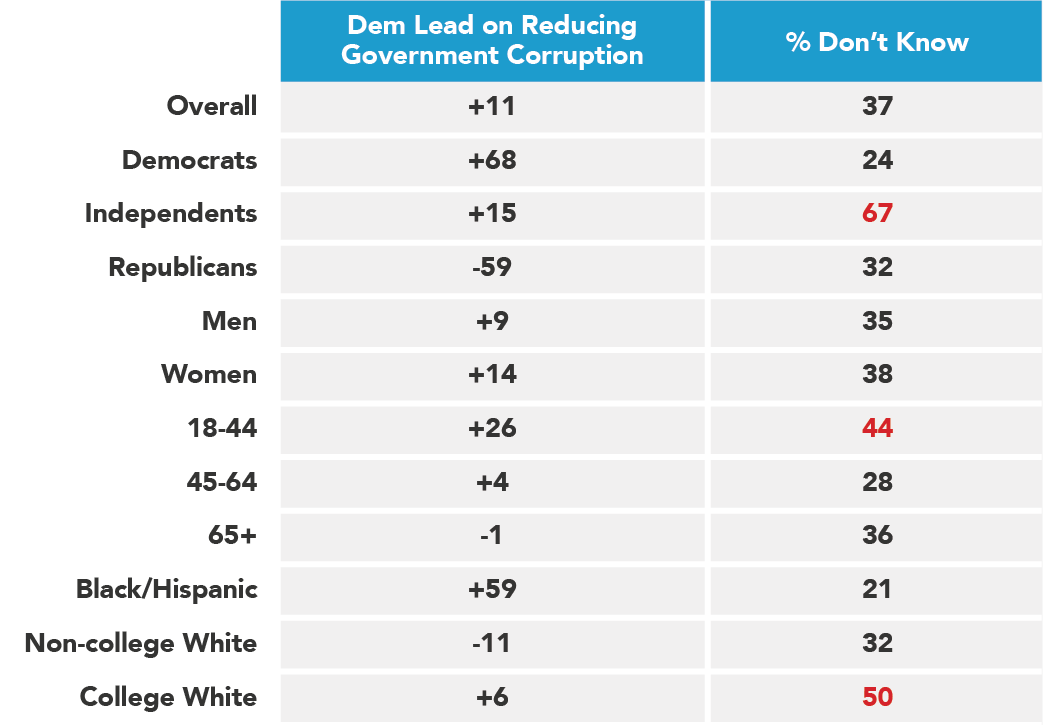
Americans want leaders to stand up to special interests and say no to corporate donors and personal perks.
With many political leaders powerfully pledging to reject corporate dollars, this month we wanted to dig into additional ways of being anti-corruption – finding that refusing perks is another positive step. In April, Navigator zeroed in on the importance of campaign donor influence when it comes to concerns about corruption in Washington. Those concerns remain, but there are other ways political leaders can demonstrate they put their constituents first.
In an open-ended question that asked voters to describe Congress, “corrupt” is the defining word. This is especially true among independent voters, as well as Democrats. Republican voters are most likely to call Congress “divided.”
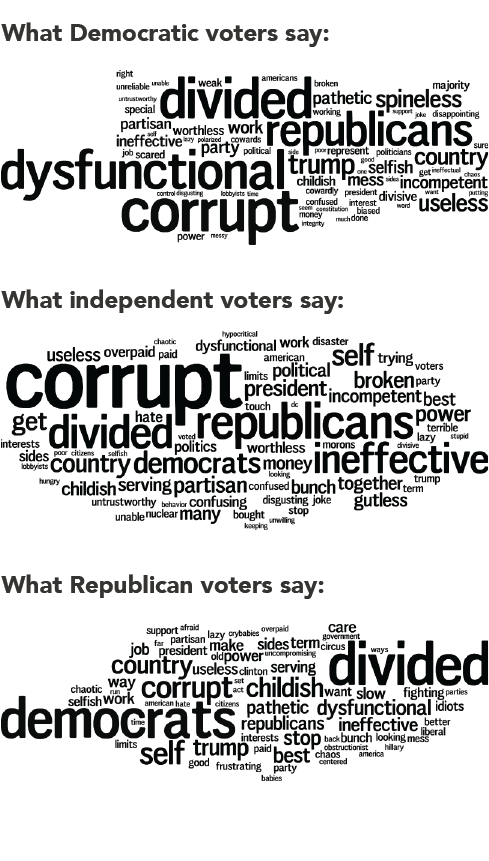
“Put voters ahead of special interests.”
Politicians need to make their priorities clear: given a list of general statements about what it looks like for a politician to get it right when it comes to special interests and corruption in government, language concerning who leaders answer to, is valued more highly than who they stand up to.
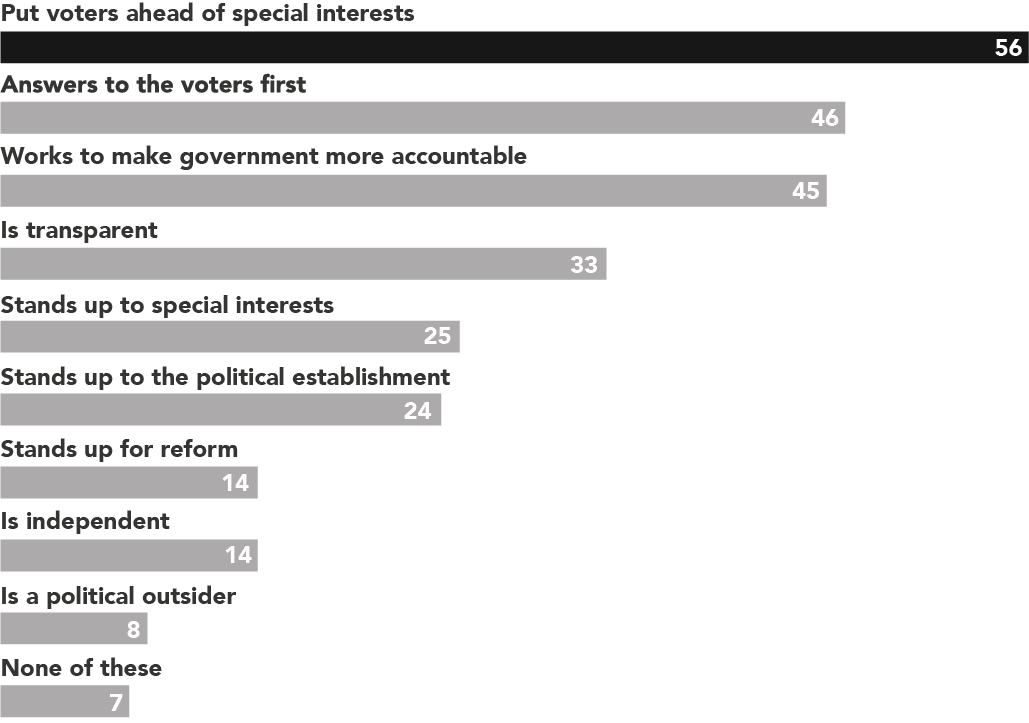
How can leaders make their priorities clear?
Commitments not to use public office to get personal perks occupy the top spots on a list of possible actions politicians could take to earn voters’ support and trust (ranked by which would make Americans “much more likely” to vote for the individual who took the action). Where politicians get their money is also important – refusing campaign donations from drug and health insurance companies comes second overall – as is transparency in dealing with lobbyists.
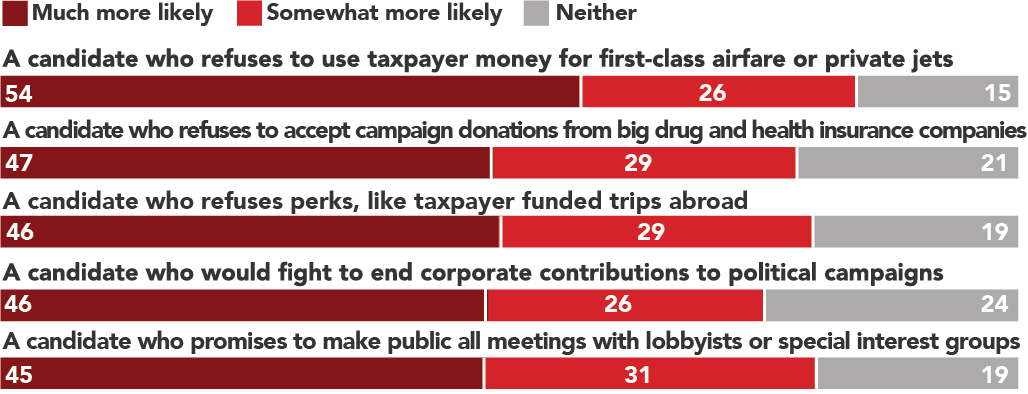
2 | Health Care Debate: One Year In
Health care remains a key dividing line, and one where Americans continue to trust the Democratic Party more.
It’s an unavoidable issue. In September 2017, Republicans last attempt at passing a full repeal of the Affordable Care Act failed in the U.S. Senate. But the issue has not gone away, and the possibility of repealing parts or all of Obama’s health care bill has loomed over debates about the Republican tax bill and the midterms. In fact, in the last few days, Paul Ryan re-affirmed the intention of a new Republican Congress – if they retain the majority – would be to again try full repeal.
Health care remains a major issue continuing to drive conversation in Washington and around the country. What’s also clear is Democrats’ lead on the issue of health care has only grown.
Navigator has tracked which party in Congress is more trusted to handle health care since June, and Democrats’ lead just reached a new high of 15 points.
Democrats in Congress now lead by 22 points among political independents (42% to 20%). Democrats also hold an 18 point advantage on health care when the sides are framed as “Democrats in Congress” versus “Donald Trump.”
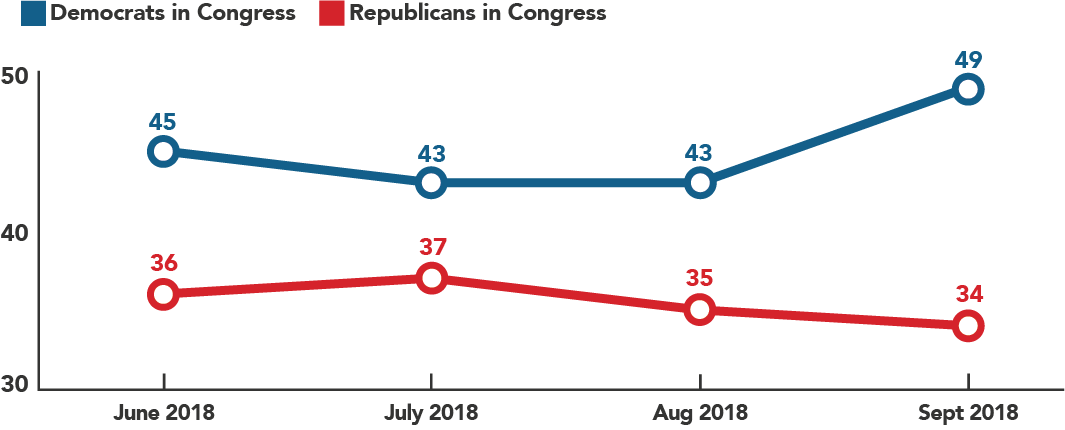
The Democratic lead has also grown when it comes to a core part of the debate over health care: costs.
By 46% to 32%, Americans prefer Democrats in Congress over Republicans in Congress to handle “keeping down health care costs,” up from a lead of just five points (39% to 34%) in June.
But Democrats’ advantage is largest on pre-existing conditions.
Protecting pre-existing conditions is the one issue, health care-related or not, that Democrats are most trusted on. This may explain why Democratic messengers around the country have been making the case that protections for pre-existing conditions remain at risk, even after the Republican failure to pass an Obamacare replacement.
Democrats lead by 26 points overall on protecting health care coverage for people with pre-existing conditions, including a 21-point lead among independents, a 33-point lead among college-educated whites and even a 9-point lead among whites without a college degree.
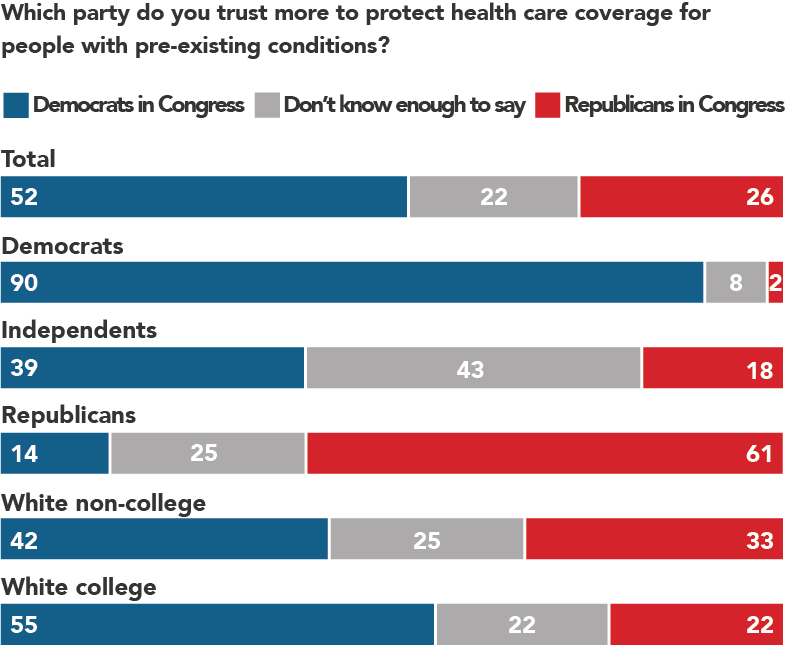
Just this month, the Navigator Research finds that, from a list of potentially concerning outcomes to emerge from Brett Kavanaugh’s confirmation, the overturning of the ACA (and rollback of protections for pre-existing conditions) comes near the top.
3 | What Americans Think About Brett Kavanaugh
Americans remain negative towards Brett Kavanaugh personally and are divided on his confirmation.
NOTE TO OUR READERS: This poll was conducted during the Senate hearings on Brett Kavanaugh’s nomination, and prior to an accusation of sexual misconduct made against him, and should be interpreted with that in mind.
Brett Kavanaugh has gained some fans – but more detractors. Last month, less than half had an opinion on Trump’s pick to replace Supreme Court Justice Anthony Kennedy, and these opinions were nega- tive by nearly 2:1. Now nearly two-thirds of Americans have formed an opinion of Kavanaugh, but they have not gotten more positive on net, with 26% favorable and 36% unfavorable. Support for Kavanaugh’s confirmation is evenly divided, with 38% in favor and 39% opposed.
One underlying belief: Trump’s motivations in picking Kavanaugh may not have been pure.
While self-identified Republicans view him positively, ratings of Kavanaugh suffer because independents have a net unfavorable opinion of him and Democrats skew even more in the other direction.
Even whites without a college degree, a group that often sides with President Trump, is split on Kavanaugh. White evangelicals, however, do tend to like him.
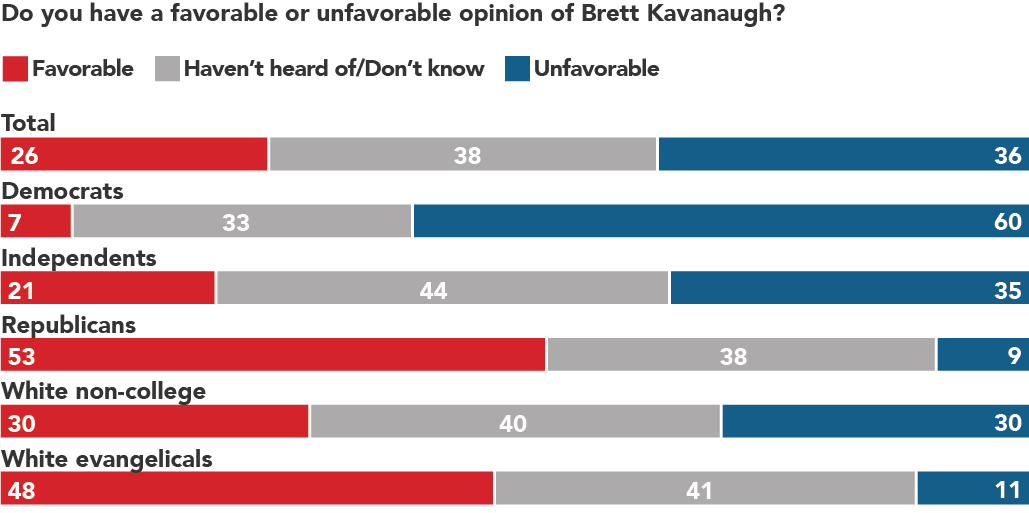
Why are Americans so sour on Kavanaugh?
One possible reason: many Americans believe he was chosen to protect President Trump from potential repercussions emerging from the Special Counsel investigation. Given several options, including some that are more charitable to the president, “because Trump thinks Kavanaugh will take his side” rises to the top overall, as well as with political independents.
Trump’s motivations aren’t the only dimension to the Kavanaugh pick. Most Americans think it’s at least somewhat likely that this Supreme Court pick will lead to the country becoming more divided (80% somewhat or very likely), that the Court will become more conservative than the country (75%), the Affordable Care Act will be overturned – ending protections for people with pre-existing conditions (74%), and the wealthy will end up with even more power to influence politics (64%).
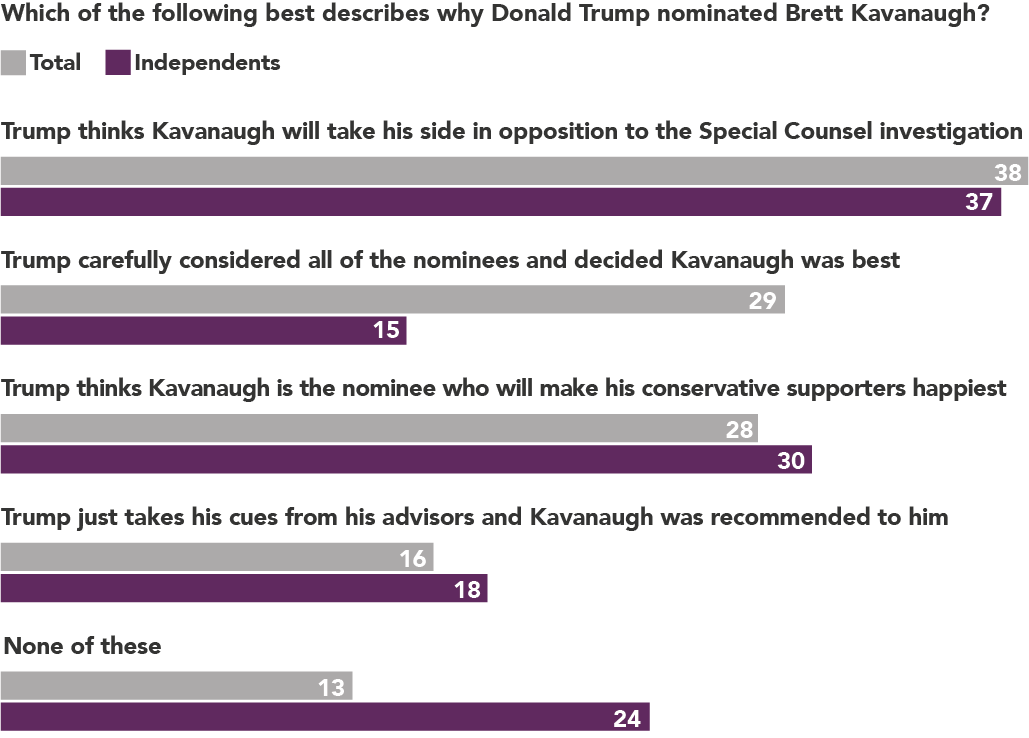
A vote on Kavanaugh’s confirmation may be likely, but the public is swayed by several arguments for delay. Advocates have made multiple arguments in favor of pushing back the date of Kavanaugh’s nomination, to which the Republican response has been a uniform “No.” Navigator tested several of these arguments in favor of delay against a longer response from Republicans defending his experience spending more than a decade on his bench, and accusing Democrats of opposing his nomination for partisan political reasons.
For each of the four matchups tested, the argument in favor of delay performed better than the argument for a quick vote. But the most effective arguments, with political independents and overall, point to the 100,000+ documents from Kavanaugh’s time working as a political staffer in Washington and to the ongoing investigation into Trump’s 2016 campaign which his Supreme Court pick might be asked to decide.
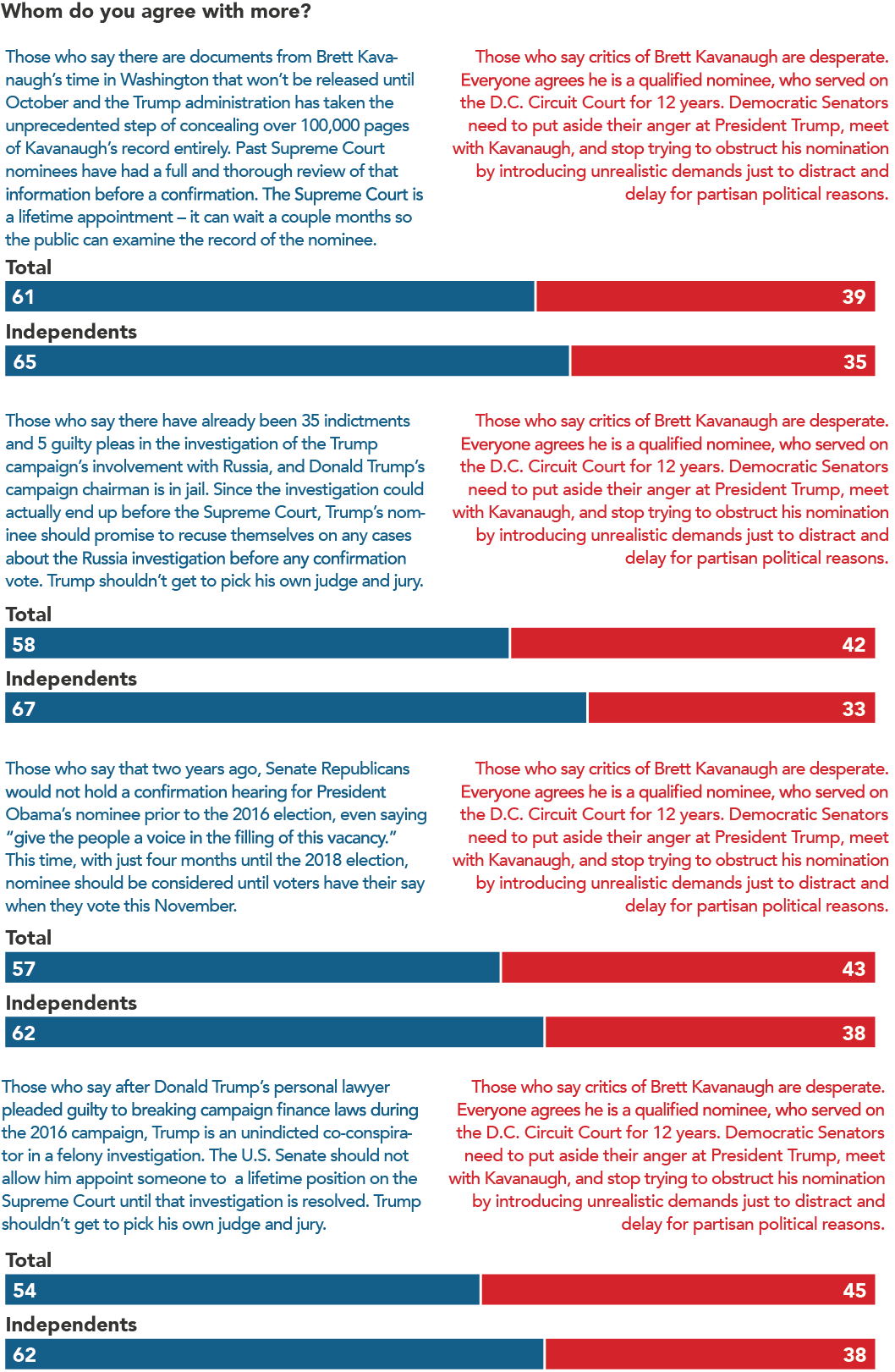
Bonus Points
The Verdict: Big Shift on Crimes Found By Special Counsel
- Since May, the Navigator has tracked two questions on Robert Mueller’s Special Counsel investigation: Do Americans support it and are they aware if it has uncovered any crimes? This month, support for the investigation is steady and near its all time high at 56% (it was 57% in August).
- As for the second question, following months of headlines about Paul Manafort’s trial, Michael Cohen’s plea deal, and George Papadopoulos’ prison sentence, a majority of Americans believe the investigation has uncovered crimes for the first time. (Note to our readers: This poll was conducted prior to Paul Manafort’s guilty plea with the Special Counsel on September 14, 2018.)
- In May, the Navigator also tested an argument that Trump should allow the Special Counsel investigation to continue because “nobody is above the law.” Agreement with that argument has held steady overall (64% in September, was 63% in May) and agreement among independents has jumped from 64% in May to 75% in September – evidence that awareness of the crimes uncovered by the investigation are helping to validate the continuation of the investigation.

Security Clearances
- Last month, Trump opened up a new front in his ongoing war against people who criticize him, by revoking the security clearance of former CIA Director John Brennan after he called the president’s behavior on Russia “treasonous.”
- This poll finds Americans tend to side with Brennan, by a clear margin: 53% say Trump’s behavior was unjustified, against only 25% who say it was justified. Among the “unjustified” crowd, the majority (or 43% of the total) also tend to say Trump’s behavior is worse than the behavior of past presidents.
- Pundits and other observers have suggested a number of motivations for Trump in revoking the clearance: Is it a strategic attempt to distract from other controversies? Does he truly want to punish those who “profit” off of their clearances? Americans think the top explanation is that “he likes to get revenge on people who wrong him” followed closely by “he just has thin skin and reacts impulsively.”

